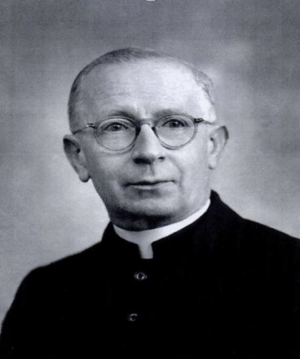For every entry, there must be an open door. Father Thomas A. Lawless (1891-1966) pried open one such door to advance the equality principle in the service of school desegregation. As we continue to celebrate the 70th anniversary of Brown v. Board of Education and Delaware’s role in that landmark Supreme Court ruling, we should pause to reflect on Father Lawless’ remarkable contributions to the cause of racial justice.
From 1945 to 1958, Father Lawless served as the principal at the Catholic Salesianum School for Boys in Wilmington. He felt at home there, having graduated from the school decades earlier. Short in physical stature (his nickname was “Mouse”), the pipe-smoking cleric was tall in his commitment to educational advancement and social justice. His faith, reserved but resolute, was integral to his life mission.
His religious creed and democratic principles were influenced by the Catholic Interracial Council and the likes of Father John LaFarge, the Jesuit author of “Interracial Justice: A Study of the Catholic Doctrine of Race Relations” (1937). Later on, Father Thomas J. Reese, of the Wilmington branch of the council, recruited two brilliant civil rights-minded lawyers to oversee the organization: William J. Duffy Jr. and Collins J. Seitz (subsequently a Delaware Chancery jurist). Soon enough, they came into Father Lawless’ orbit – their collective efforts proved seminal in Delaware’s move toward school desegregation.
At the outset, however, Father Lawless’ 1947 attempt to integrate Salesianum failed in the face of racist opposition. But things changed by November 1950, when he quietly admitted five African American students: James Owens, Willie Jones, Fred Smith, Alfred Connell and Thomas Connell. Clad in coats and ties, they all walked proudly through the school’s front doors. The event prompted a front-page headline in the Wilmington Morning News: “Negro Students Admitted to Salesianum High School.”
The following day (Nov. 16, 1950), the paper heaped editorial praise on the school: “In this instance, Catholics have led the way in breaking down the bars of segregation in the schools and we think that members of that faith have every reason to feel pride in the way the step was taken and announced.” When invited to give the 1951 graduation address, Judge Collins Seitz (who in 1950 ordered the University of Delaware to be integrated) lauded Father Lawless for having the courage to practice what too many of us only preach. When some parents took exception to the desegregation efforts and threatened to remove their children, they were met with firm resolve: The Black students “are staying. If you don’t like it, don’t let the door hit you in the tail end on your way out.”
It was a new day in Delaware, one with promise even in the face of opposition. By 1953, eight African American students were in Salesianum’s incoming class; the next year that number increased to 19.
Remember, all of this occurred before the U.S. Supreme Court handed down its ruling in Brown v. Board of Education (1954), a decision declaring segregated schools unconstitutional, even though it took exasperatingly long to implement.
St. Francis de Sales once said: “We cannot always do extraordinary things, but we can do ordinary things extraordinarily well.” True is as that stirring maxim is, it might respectfully be amended in the case of Father Lawless: he, along with others, did extraordinary things extraordinarily well.
Ronald Collins is the Lewes Public Library’s Distinguished Lecturer and author of “Tragedy on Trial: The Story of the Infamous Emmett Till Murder Trial” (2024). The first installment in this series can be found at tinyurl.com/3h7fz2je; the second installment at https://tinyurl.com/2m2rcec5; the third installment at https://tinyurl.com/3pxdvv5s.





















































